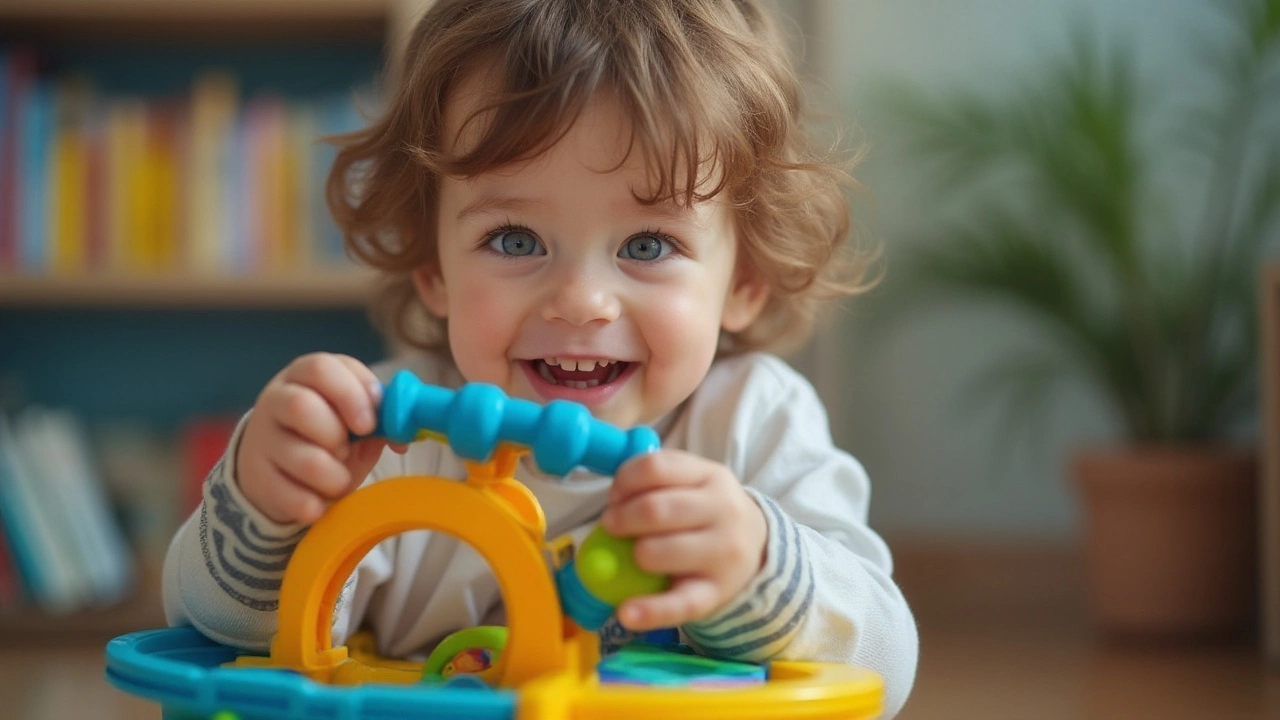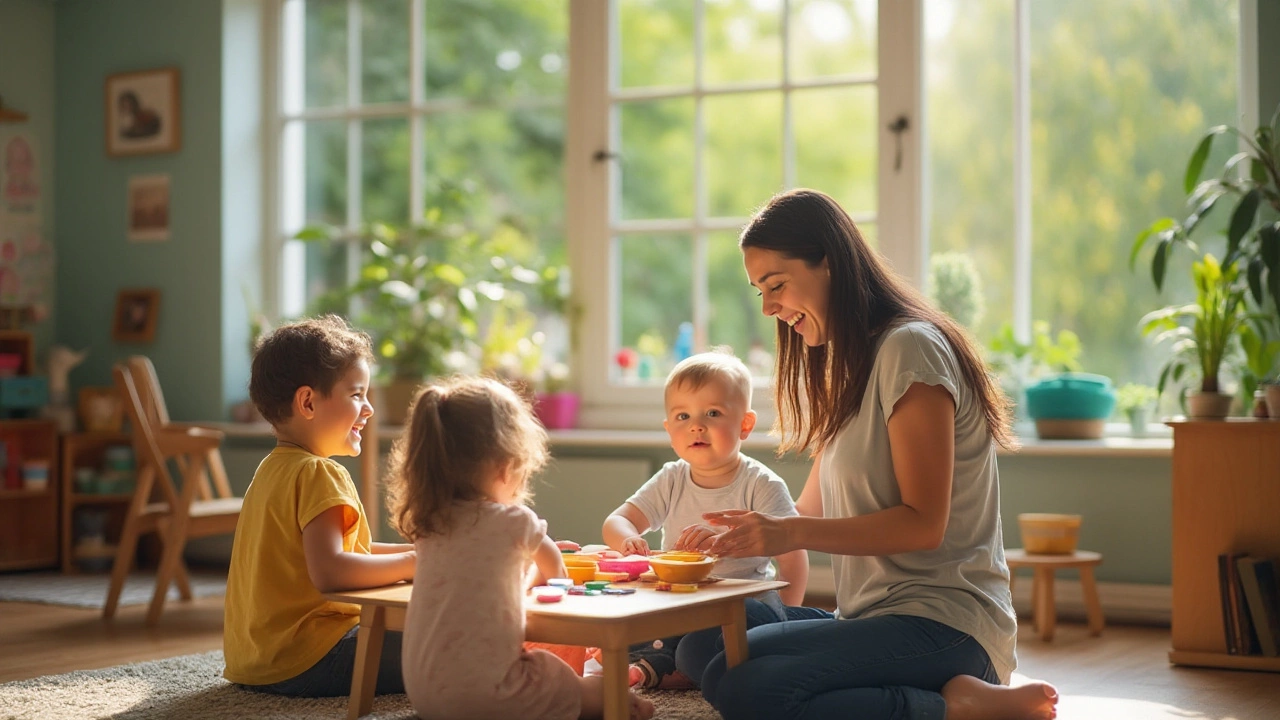Deciding when to start your child on their educational journey can be a daunting task. Parents often wonder about the ideal age to begin formal education and its impact on development. This decision significantly influences a child's readiness and their enthusiasm for learning in the years to come.
Once thought of as simply a way to occupy children while parents worked, early education is now recognized for its profound impact on a child's development. Starting at the right age can nurture cognitive abilities, enhance social skills, and instill a lifelong love of learning.
By focusing on key elements such as child development milestones and play-based learning, parents can confidently guide their children towards a nurturing start in education. Join us as we delve into the timeline that best supports young learners and how families can prepare for these exciting first steps.
- Determining the Best Age for Early Education
- Benefits of Starting Early
- Cognitive and Social Development Considerations
- Play-Based Learning and Its Role
- Tips for Parents on Early Education Transition
Determining the Best Age for Early Education
Embarking on the journey of early education evokes a myriad of questions, chief among them being what the best age for starting school is. Traditionally, children have been considered ready for preschool around the age of three. However, this is not a one-size-fits-all scenario, and several factors must be weighed before making this significant decision. Children develop at their own pace and considering their individual needs can guide parents towards making an informed decision about the right time to introduce formal learning. The readiness of a child can often be determined by observing their social skills, curiosity about the world, and basic self-care capabilities, such as following simple instructions or playing independently for short periods.
Several studies suggest that starting early education around three to four years of age can provide a beneficial boost to a child's development. This formative period is critical for setting the foundation of lifelong learning and adaptability. Children in this age bracket are in a key stage of cognitive growth, capable of absorbing new information rapidly, and forming meaningful social connections with peers. The benefits of starting preschool at this age often include enhanced language skills, improved social competencies, and the nurturing of creativity through structured play and activities.
When contemplating the best starting age for early education, it is crucial to consider the child's emotional maturity and capacity for engaging in group settings. For many children, enrolment in a preschool that offers play-based learning can make the transition smoother and more enjoyable. Such settings allow them to explore their interests freely while developing essential skills in a structured environment.
"Early childhood education plays a pivotal role in supporting the development of young children," according to the National Institute for Early Education Research.Schools offering a flexible curriculum tailored to young learners' intrinsic desires to explore and question can vastly enhance the experience and outputs of early education.
Parents are encouraged to also consider the possible disparities between chronological and developmental age. While a child may be of a certain age that fits typical preschool enrolment standards, their unique personality, emotional readiness, and social skills might indicate a different need. Therefore, conversations with pediatricians, child psychologists, or early education experts can provide invaluable insights tailored to individual children. This personalized approach ensures children do not just start learning, but begin on a pathway that best equips them for future educational success. Making this decision with foresight can help set children on a path abundant with academic and personal growth opportunities.
Benefits of Starting Early
When children embark on their educational journey at a young age, the advantages they gain are manifold. Research shows that children who start in early education, such as preschool, develop crucial social skills more rapidly. They learn how to interact with peers, share resources, and function in a structured environment, all essential components for thriving in later educational settings. These early experiences can set the stage for a positive attitude toward learning and school. Notably, children engaged in early education are more likely to demonstrate advanced language skills, which contribute to more effective communication abilities. The confidence instilled through these interactions often translates to a greater sense of independence and willingness to explore new concepts and challenges.
Moreover, studies indicate starting education early can have profound cognitive benefits. Children during this stage are like sponges, absorbing new information rapidly. Exposure to diverse learning materials fosters the development of neural connections that remain beneficial throughout their lives. This period is crucial for cultivating thinking patterns and problem-solving strategies. A report by the National Institute for Early Education Research highlighted that children in early education programs show higher performance in mathematical and reading skills as they progress into formal schooling. As learning structures become routine, children also find themselves becoming adept at following instructions, an essential skill that underpins future academic achievement.
There's a significant emphasis on the importance of play-based learning in preschool age. Far from being mere child's play, structured playtime enhances creativity and innovation, allowing children to experiment in a safe environment. This method promotes self-expression and emotional regulation. Educators advocate for play as an integral component of early education, which nurtures discovery and exploration without the pressure of performance assessments. The Finnish education model, renowned for its success, strongly utilizes play-based learning, showing remarkable outcomes in student satisfaction and performance.
Starting early in a learning environment is also known to impact emotional growth positively. Emotional intelligence developed during these formative years extends beyond the classroom. Children who experience early education often show improved empathy and better frustration management. This is crucial, as emotional skills form the backbone of healthy relationships and workplace harmony in adulthood. According to child psychologist Dr. Amanda Gummer, "The skills developed in early educational settings, such as teamwork and resilience, play a pivotal role in forming well-rounded individuals."
"The early years are crucial for developing the skills and attitudes necessary for a lifetime of learning." – National Association for the Education of Young Children
Parental involvement during this time cannot be understated. As children experience these environments, regular parental interaction about school activities reinforces positive educational attitudes. Committing just a few minutes each day to discuss what the child learned can pave the way for a lifelong interest in education. Participation in school events and parent-teacher meetings enhances this effect, showing children that their education is valued. These collaborative efforts between school and home solidify the foundation for sustained educational enthusiasm and success.

Cognitive and Social Development Considerations
The early years of a child's life are crucial for laying the foundation of cognitive and social skills. The brain is highly adaptable at a very young age, making this period ideal for forming neural connections that enable learning and memory. Studies indicate that children who begin their early education by the age of three or four often have improved cognitive abilities when they reach primary school. This age sees them absorbing information like sponges, and when exposed to rich, diverse environments, their aptitude in language, math, and problem-solving grows exponentially.
Social development during these years is equally significant. Interaction with peers plays a critical role in teaching children how to share, cooperate, and resolve conflicts. Group activities in a preschool setting encourage children to develop empathy and understanding—a foundation for emotional intelligence. Children learn to express themselves, imprinting lessons of communication that are essential in later life. Importantly, learning in a group helps them understand their social boundaries, creating a sense of individual identity while respecting others. According to the National Association for the Education of Young Children, "young children's social and emotional development is closely connected to their success in school and life."
"The early education environment acts as a miniature community, providing a vital arena for developing critical social skills," says child psychologist Dr. Emma Hughes.
This stage is also where children's curiosity needs the right balance of guidance and freedom. Educators in early education settings often employ play-based learning strategies, which have been shown to significantly enhance both cognitive and social competencies. Through imaginative play and exploratory activities, children learn to negotiate roles, follow rules, and channel their creativity in meaningful ways. Such experiences not only boost language development but also foster critical thinking skills. It's the marrying of structured guidance with the liberty to explore that prepares children for a lifetime of learning and adaptation.
Of course, every child's development is unique—some flourish with an early start, while others progress better with more time spent at home. Parents and educators must pay attention to the readiness of the child, considering factors such as the child's emotional maturity and ability to handle separation from parents. Research highlights that by understanding these markers, adults can facilitate a more enriching early educational experience, accentuating the learning benefits children gain from such exposure.
Play-Based Learning and Its Role
In the realm of early education, the concept of play-based learning has gained considerable momentum due to its unique blend of enjoyment and pedagogy. Unlike traditional rote learning methods, this approach taps into children's natural curiosity and innate desire to explore their surroundings. At its core, play-based learning views play as a valuable and integral part of child development, serving as a primary conduit through which young minds perceive and interpret the world around them. This method supports children in developing crucial skills such as problem-solving, creativity, and social interaction, setting a strong foundation for future learning experiences.
Children thrive in environments where play is championed, as it allows them to engage their senses fully and fosters an adventurous spirit. Research has shown that children who partake in early education that emphasizes play learn more efficiently and exhibit greater enthusiasm and motivation. The very nature of play provides ample opportunities for children to test boundaries, experiment with new ideas, and conquer challenges at their own pace. As they navigate through various scenarios during play, they are intricately building neural connections that aid in cognitive development, language acquisition, and emotional regulation. This is in stark contrast to more rigid educational models that often stifle creativity and limit a child’s ability to express themselves.
The effectiveness of play-based learning is backed by substantial research. Notably, according to a report by the American Academy of Pediatrics, “Play is essential to development because it contributes to the cognitive, physical, social, and emotional well-being of children.”
Respected child psychologist Jean Piaget famously stated, "Play is the work of childhood." This sentiment encapsulates the understanding that children learn best when they are actively engaged in play, supported by teachers who skillfully incorporate educational elements into the activities.Moreover, educators practicing this technique often utilize a wide range of materials and experiences—from building blocks to engaging storytelling sessions—to create a rich tapestry of learning experiences that cater to multiple intelligence types.
A pivotal component of play-based learning is its adaptability to each child’s unique learning style and pace. Preschool age children possess varying levels of skills and interests, meaning that a one-size-fits-all approach is often inadequate. Play-based environments provide a flexible framework that respects these differences, enabling educators to tailor learning experiences and nurture each child's potential. Through observation and interaction, teachers can identify each child's strengths and areas for growth, allowing them to guide and extend learning through thoughtfully crafted play activities.
To effectively foster play-based learning, educators and parents alike must create environments rich with open-ended resources, promote child-directed exploration, and provide the space for children to lead their adventures. Some ways this can be achieved include setting up areas for imaginative play, such as dress-up corners, art stations filled with diverse materials, and outdoor spaces where children are free to engage with nature. The role of the adult in these scenarios is crucial but unobtrusive, serving as facilitators who gently encourage exploration and provide subtle guidance only when necessary.
Ultimately, the emphasis on play-based learning during the early education years harnesses the boundless energy and creativity inherent in young children, preparing them not just academically but emotionally and socially for what lies ahead. By fostering these elements in a nurturing learning environment, children are likely to develop a positive attitude towards learning, forming the basis for lifelong educational success.

Tips for Parents on Early Education Transition
Embarking on the journey of early education with your child is both an exciting and complex process that requires thoughtful consideration and preparation. It’s not just about picking the right preschool; it’s about ensuring that both you and your child are ready for this new chapter. The transition into formal education is a significant milestone, marking the start of a lifelong learning experience influencing their cognitive and emotional growth. Therefore, understanding the best ways to prepare your child can make a considerable difference in their adjustment and success. Start by talking to them about what to expect, addressing their questions, and alleviating any anxiety related to new experiences. A good way is to include narratives from your own childhood learning experiences to make it relatable.
Interacting with teachers and other parents can also provide invaluable insights. Parents who have already navigated this period may offer practical advice and personal anecdotes that illustrate common challenges and effective strategies. Consider visiting the school together before the first day if possible, allowing your child to familiarize themselves with the environment. This can ease any feelings of apprehension and help them look forward to attending school. Building a consistent routine at home that aligns with the school schedule is also beneficial, as it prepares the child to manage their time well.
Placing emphasis on the value of play in education cannot be overstated. Many early childhood education systems now focus on play-based learning, which has been shown to effectively engage young learners. According to a report from the National Association for the Education of Young Children (NAEYC), integrating play into daily activities fosters creativity and enhances various skill sets, including problem-solving and social interaction. It’s crucial during this transition for parents to recognize and incorporate play-based practices at home. Ensure there is time every day for your child to participate in recreational activities that stimulate curiosity and learning.
"Children learn as they play. Most importantly, in play children learn how to learn." - O. Fred Donaldson
Communication with the school's educators is key to staying informed about your child’s progress and any areas that may require attention. Establishing a dialogue with teachers encourages a collaborative approach to addressing any concerns that may arise. Regular feedback from the school allows you to supplement learning at home and provide the necessary support your child needs. Finally, celebrating milestones, no matter how small, reinforces the idea that learning is positive and rewarding. Celebrate completing the first week or learning a new song, and encourage your child to share what they enjoyed most about their school day.
